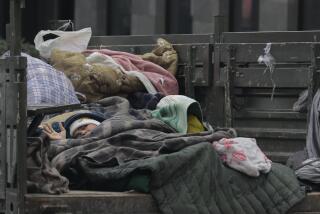Armenia’s Foreign Minister Quits Post : Caucasus: Fresno-born Raffi Hovannisian was asked to resign after clashes over foreign policy with newly independent country’s president.
- Share via
MOSCOW — Raffi Hovannisian, a Palisades High School graduate who as foreign minister of Armenia strove to put his tiny ancestral homeland back on the diplomatic map, resigned his post Friday at the request of the president of the former Soviet republic.
“I leave this post with the sense that my work is incomplete,” Hovannisian, 33, said in a statement. He said he had “a clean conscience” because he has stood by his “principles of diplomacy.”
Hovannisian traveled to more than 50 countries and helped gain recognition for Armenia from more than 120 countries during his year as foreign minister. He gained wide popularity. A recent poll showed his approval rating at 96%--higher than president’s.
Born in Fresno, raised in Southern California and educated at the Fletcher School of Law and Diplomacy at Tufts University in Medford, Mass., Hovannisian’s devotion to the land of his forebears is so great that he left a six-figure income as a Los Angeles lawyer to help rebuild Armenia.
But clashes with President Levon Ter-Petrosyan over the newly independent country’s foreign policy--and most heatedly over its relations with neighboring Turkey--have cut short his tenure, officials said.
Hovannisian has pursued a policy of friendly relations with all of Armenia’s neighbors, because, he said, his tiny country is too economically and militarily vulnerable to afford enemies.
However, he also acted on the principle that unless Armenia conducts itself as an equal, its neighbors will not learn to respect it, according to Vartan Oskanian, head of the Foreign Ministry’s North America section.
“The president feels we have to be on good terms with all our neighbors. His approach with Turkey is very mild,” said Oskanian, who is also an Armenian-American. “The minister has been tougher.”
During a speech in Istanbul last month, Hovannisian said Turkey is accused of “grave human rights violations” and that it “cannot yet claim to be a model of European values,” while Armenia has embraced democracy from the start.
Armenians feel animosity toward Turkey, which is responsible for the deaths of hundreds of thousands of Armenians in a campaign of genocide in the years before World War I, but Ter-Petrosyan believes that bitterness must be put aside because independent Armenia needs Turkey as an ally. The president’s press service quickly denounced Hovannisian’s criticism of Turkey, saying it “conflicted with Armenia’s general political course.”
Relations between Ter-Petrosyan and Hovannisian have been tense ever since.
Ter-Petrosyan’s spokesman, Ruben Shugaryan, called Hovannisian’s Istanbul statement “emotional and very harsh.” He noted that “such a speech is permissible before some Armenian audience abroad but not in Turkey, especially not when the (Turkish) foreign minister is present.”
Hovannisian and Ter-Petrosyan also disagree about Nagorno-Karabakh, an Armenian enclave within the neighboring republic of Azerbaijan, where a territorial battle has been raging for four years. Hovannisian believes that Armenia should recognize Nagorno-Karabakh as an independent country, while Ter-Petrosyan says that other countries should recognize it first, Oskanian said.
More to Read
Sign up for Essential California
The most important California stories and recommendations in your inbox every morning.
You may occasionally receive promotional content from the Los Angeles Times.












